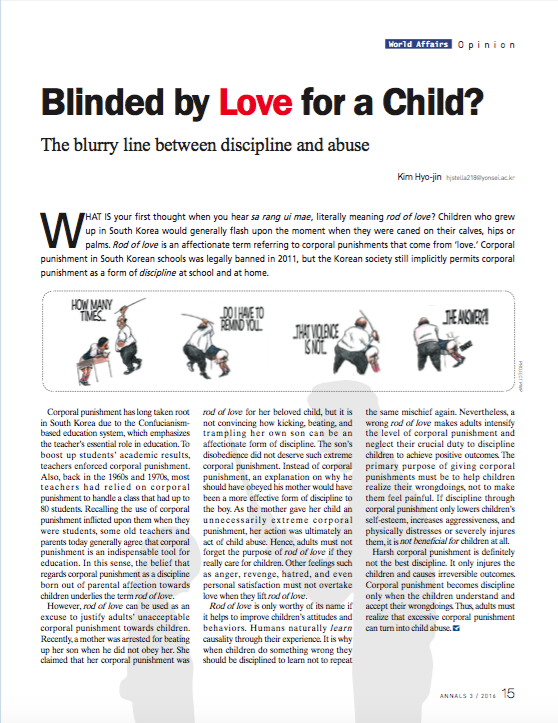The blurry line between discipline and abuse

WHAT IS your first thought when you hear the phrase sa rang ui mae, literally meaning rod of love? Children who grew up in South Korea would generally think about a moment when they were caned on their calves, hips or palms. Rod of love is an affectionate term referring to corporal punishments that come from ‘love.’ Corporal punishment in South Korean schools was legally banned in 2011, but Korean society still implicitly permits corporal punishment as a form of discipline at school and at home.
Corporal punishment has deep roots in South Korea due to the Confucianism-based education system, which emphasizes the teacher’s essential authority in education. To boost students’ academic results, teachers enforced corporal punishment. Also, back in the 1960s and 1970s, most teachers relied on corporal punishment to handle a class that had up to 80 students. Recalling the use of corporal punishment inflicted upon them when they were students, some older teachers and parents today generally agree that corporal punishment is an indispensable tool for education. In this sense, the belief that regards corporal punishment as a discipline born out of parental affection towards children underlies the term rod of love.
In reality, however, the rod of love idea can be used as an excuse to justify adults’ unacceptable corporal punishment of children. Recently, a mother was arrested for beating up her son when he did not obey her. She claimed that her corporal punishment was a rod of love for her beloved child, but it is not convincing how kicking, beating, and trampling her own son can be an affectionate form of discipline. The son’s disobedience did not deserve such extreme corporal punishment. Instead of corporal punishment, an explanation of why he should have obeyed his mother would have been a more effective form of discipline for the boy. As the mother gave her child an unnecessarily extreme corporal punishment, her action was ultimately an act of child abuse. Hence, adults must not forget the genuine purpose of the rod of love if they really care for children. Other feelings such as anger, revenge, hatred, and even personal satisfaction must not overtake love when they lift the rod of love.
Rod of love is only worthy of its name if it helps to improve children’s attitudes and behavior. Humans naturally learn causality through their experience. It is why when children do something wrong they should be disciplined to learn not to repeat the same mischief again. Nevertheless, a wrong application of the so-called rod of love makes adults intensify the level of corporal punishment and neglect their crucial duty to discipline children to achieve positive outcomes. The primary purpose of giving corporal punishments must be to help children realize their wrongdoings, not to make them feel pain. If discipline through corporal punishment only lowers children’s self-esteem, increases aggressiveness, and physically distresses or severely injures them, it is not beneficial for children at all.
Harsh corporal punishment is definitely not the best discipline. It only injures the children and causes irreversible outcomes. Corporal punishment becomes discipline only when the children understand and accept their wrongdoings. Thus, adults must realize that excessive corporal punishment can easily turn into child abuse.

